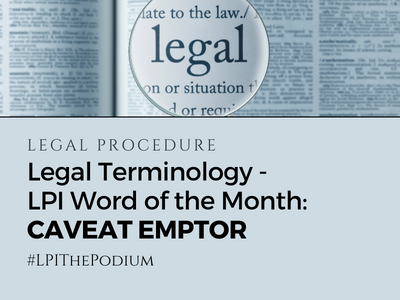
CAVEAT EMPTOR
With Holiday Shopping right around the corner, I could not help but feature the phrase caveat emptor for this month’s phrase of the month. It translates to “let the buyer beware.” The phrase should serve as a warning that an individual makes a purchase at their own risk, and everyone should do their due diligence when considering a purchase. A buyer who fails to reasonably examine an item before making a purchase, will be unable to recover for defects in the product which could have been discovered had they done so. With online shopping being the preferred shopping method for many, I think it is even more important to carefully review the website, the shipping policies, the return policies, and try to determine where that merchandise comes from.
The term caveat emptor is commonly used in real estate transactions. It relates to adverse situations that may come up after the closing of the sale. It is important for a home buyer to make every effort to discover any property defects. It also applies to other types of goods, such as cars or items purchased at thrift stores or yard sales. This principle does not give sellers the right to promote a fraudulent transaction. For example, if an individual sells a car to another individual, and lies about the mileage, maintenance history or possible repairs, the seller would have committed fraud and the buyer would be entitled to damages. A seller who withholds material information regarding a product is not protected by this doctrine. However, if an item is sold “as is,” caveat emptor applies and the purchase is final.
A different phrase often applies to sales in the U.S., and that is caveat venditor, which translates to “let the seller beware.” Goods and services are often covered by an implied warranty. Unless the item is labeled “as is,” most consumer products are guaranteed to function when used for their intended purpose. This principle also forces a seller to take responsibility for the product and discourages sellers from selling inferior products.
Categorized in: Legal Procedure
| << previous | next >> |








